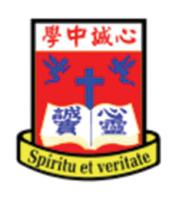| Language Policy |
We advocate bilingual ability in Chinese and English. Students are taught in both languages in order to develop good comprehension, writing, listening and speaking skills, fostering useful bilingual ability for the society. |
| Learning and Teaching Strategies |
Teachers are encouraged to make use of multimedia resources during the learning and teaching processes. Students are free to gather information from newspapers, publications and the internet to enhance their self-learning abilities. Discussion and presentation skills are included in academic subjects, and some of the tests and examinations are replaced by research projects. School-based curriculum are designed for subjects like Chinese History, History, Integrated Humanities and General Science in junior forms, to promote a student-oriented learning and teaching environment. We have a diversified curriculum which places emphasis upon language ability, logical thinking, presentation skills and the application of information technology. School-based curriculums are also developed to prepare for the new senior secondary curriculum. A daily morning session is organised for junior form students under our Literacy Program, with the aim of fostering a culture of reading and writing. For S.1 to S.4 students, the Fun with Reading Incentive Program develops a reading habit among students. Reading programs are also available in both Chinese and English. |
| School-based curriculum |
1. Electives: 2X and 3X. Students can choose 2 to 3 subjects from the 16 elective subjects offered by our school in the senior secondary curriculum according to their abilities and interest.<br> 2. Curriculum highlights: We have adopted a school-based curriculum for subjects like Chinese History, History, Integrated Humanities and Science in junior forms which is tailor-made to suit the need of students and help equipping them for the NSS curriculum. |
| Approach to Catering for Learner Diversity |
Our school has after-school enrichment and remedial courses in junior forms to cater for the needs of students with different learning abilities. |
| Approach to Integrated Education |
Our school recruited special educational needs student (SENs) support committees, including special educational needs coordinator, educational psychologist, clinical psychologist, counselling psychologist, speech therapist, social workers, student counsellor, Chinese teachers, English teacher, Science teacher, and Mathematics teachers. Educational psychologist provides assessment services for students of having suspected special learning difficulties; clinical psychologists, counselling psychologist, social workers and student counsellor offer emotional support; and speech therapist arranges assessment and speech training. Parents and teachers educational trainings are given to enhance skills for supporting students with learning difficulties so as to foster the culture of integration. The team coordinates with whole school in implementation of the 3 Tier Support Mode in order to support students’ learning differences and personal growth, and to assist parents and teachers taking care of learning differences. <br><br>In Tier-1, <br>-Early identification and diversified teaching strategies to create positive learning environment support for students. <br><br>In Tier-2,<br>-Counselling programs and training groups for SEN students.<br>-Social emotional learning training groups, Life-planning themed counselling programs, and intensive tutorial lessons help achieving personal growth supports of SEN students. <br>-Special arrangements for lessons, homework and examinations for SEN students.<br><br>In Tier-3,<br>-Cooperation with professionals giving intensive individualized supports to SEN students. <br><br> |
| Education Support for Non-Chinese Speaking (NCS) Students |
|
| Home-School Co-operation |
Apart from organizing activities for parents and students to improve their relationship, our Parent-Teacher Association also provides talks and training courses for parents to enhance the understanding of the school’s goals and policy in education. |
| School Ethos |
Students attend a reading and writing session every morning before classes start. We cultivate an academic atmosphere by organizing and running the Reading Programs, Newspaper Reading Program, academic subject exhibitions and various book exhibitions. We adopt a whole-person education approach for all-round development of the students, and implement a disciplinary and counseling program for the whole school designed to meet the needs of all the students. |
| School Development Plan |
1. Support program for academically gifted / under-privileged students;<br>2. Development of students' reading and writing skills;<br>3. Life planning for students;<br>4. E-learning and STEM education. |
| Teacher Professional Training and Development |
Each year, numerous activities are organized with a view to improving the professional standards of our teachers. These include the Teachers' Professional Training Camp, Joint School Teachers' Professional Development Day, Collaborative Lesson Preparation and Class Observation by Peers, etc. |
| Life-wide Learning |
A diverse range of activities is organized for students to help them develop multiple intelligence. Students' talents are fostered through practical experience and participation, along with implementation and organization of these activities. In addition to examinations, students' abilities are also comprehensively assessed through research projects, activities, written reports and oral presentations. |
